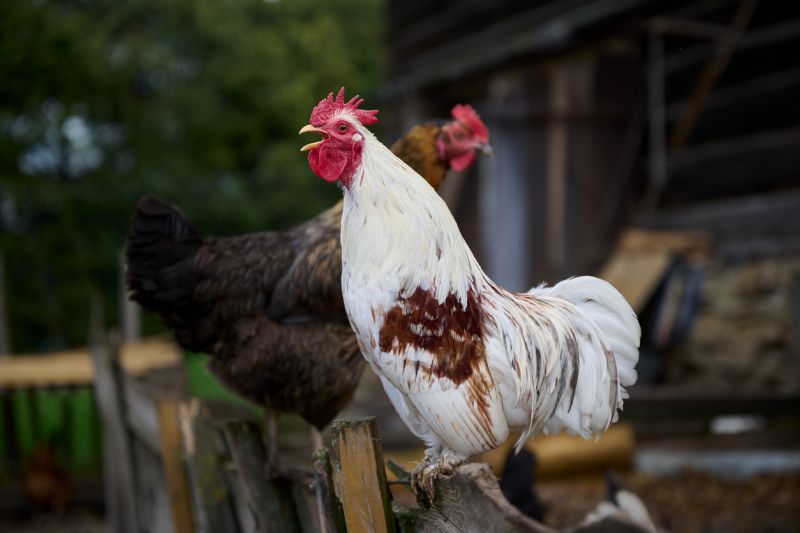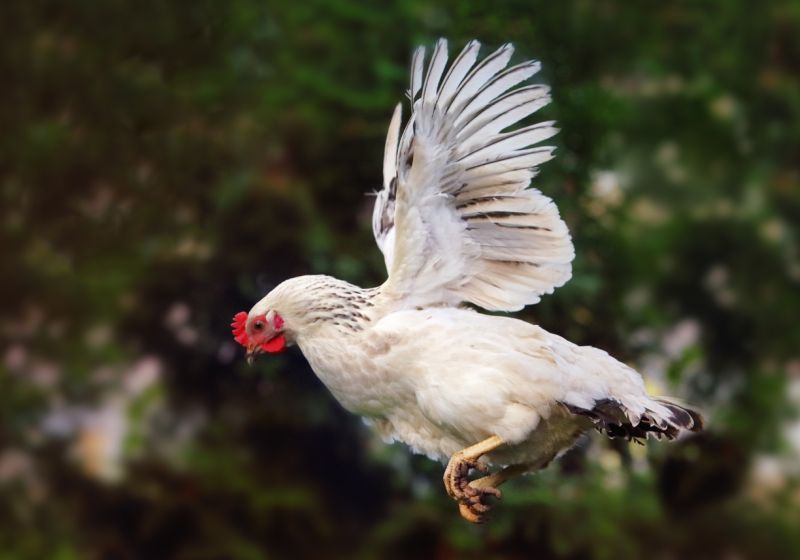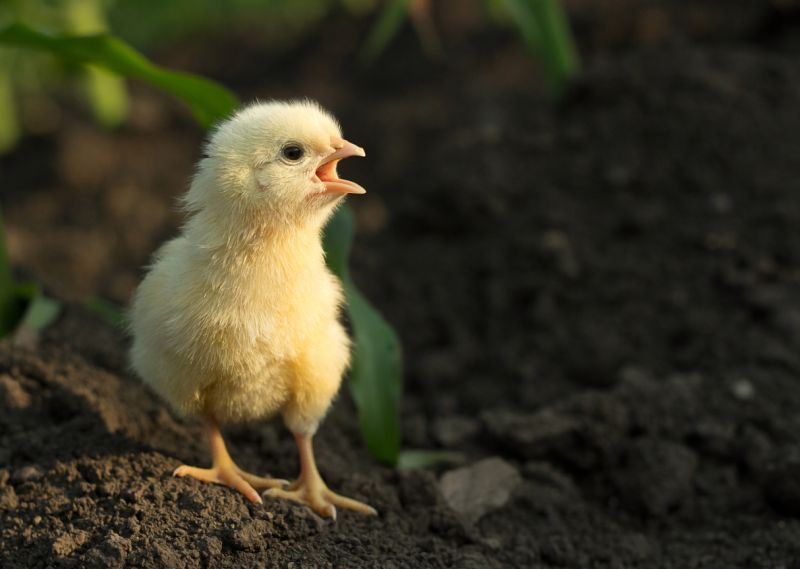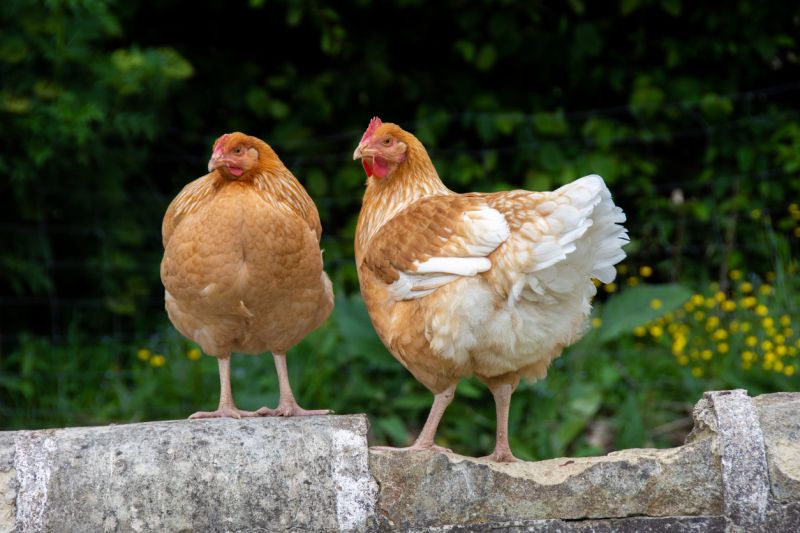Chickens can be quite talkative, and not all of their clucks and chirps sound the same. All chicken sounds have different meanings, depending on how they sound and the context.
If you’ve ever wondered, “what does a chicken say?,” you might be able to find out based on their calls. So, what does a chicken sound like, and what do certain chicken noises mean? Understanding their sounds may help you better care for them.
What Noise Does a Chicken Make?

“What sound does a chicken make?” is a lot more complicated than most people realize. There are lots of common chicken sounds that you might hear, including clucking, chattering, and even shrieking.
In your flock, there’s a chicken hierarchy that’s decided based on the behaviors and body language of the chickens. The most dominant chickens are usually the ones that will make the most noise.
If you have a chicken making weird noise, it might not be as uncommon as you’d expect. Here are nine noises these birds make, along with what they might mean.
Low Murmuring
When you see a flock of chickens walking around, you will most likely hear a soft murmuring sound coming from them. These happy chicken sounds mean the birds feel content and safe. Some might even make a chicken purring sound similar to a cat.
This murmuring can occur at any point throughout the day. It usually happens when chickens are doing their everyday activities like foraging or exploring their enclosure.
Hens usually stay within earshot of each other so they can hear murmurs from the others. That way, if a chicken stops murmuring and lets out an alarming sound, the others will hear.
Clucking
People think clucking the most common sound a chicken makes, but it’s a noise a hen makes that’s usually only used by mothers. It’s the way that hens interact with their chicks, sometimes even before they hatch.
When hens sit on their eggs, they may cluck, coo, or purr softly to comfort them. By talking to the chicks so early on, the chicks feel safer and more comfortable when hatching from their eggs. They’re also able to recognize their mother’s sounds right away after hatching.
Hens will often make a “tuk, tuk, tuk” sound when encouraging their chicks to eat. Also, a low-pitched chicken clucking sound alerts the chicks to stay close to their mom. Since mother hens make so many sounds at their chicks, the chicks will start making their own sounds in response.
High-Pitched Calling

One high-pitched calling that chickens might make is an alarm cry. If a chicken screams or shrieks, it means they are warning the other chickens of a predator that’s attacking from above, such as a hawk. This will trigger the other hens to find cover or stand very still.
If a predator is attacking from the ground, chickens have a different method of alerting each other. Instead of a loud scream, they will start a repetitive clucking sound that will get faster as the threat gets closer. This call is less urgent than the one for a sky attack. Hens are more likely to listen to the calls of other hens rather than a rooster.
An alarm is like a chicken sound in words. The chickens know exactly what the other one is talking about if they’re alerting them of danger.
If a hen is captured, they will let out loud squawks as a cry for help. This chicken crying sound could occur if they’re captured by a predator or if a rooster is giving them unwanted attention. A more dominant rooster will usually come to protect the hen.
So, if you hear any of the above shrieking noises, you should check on your chickens immediately. You may be able to scare off a threat before your birds get hurt.
On rare occasions, hens might also make a “lonely call” sound. They will let out a loud, demanding call to get a rooster to come to them. Most roosters will rush to see what the problem is, even though the hen might just want company.
Cackling
When hens let out a happy cackling sound, this is also known as “the egg song” or a “chicken egg laying sound.” Some describe it as a chicken saying, “buk, buk, buk, ba-gawk.” The first hen starts making these sounds as she lays an egg. Then, the other hens join in to celebrate.
This “song” will be much louder if lots of chickens are near the nesting box. All hens resting nearby will likely join in. The only time you’ll notice a significant difference in these sounds is if a hen is sitting in another hen’s favorite nesting box. Then, one of them may cackle more loudly to get the other one to move.
Once the more dominant hen gets the nesting box she wants, the aggressive cackling will die down. Adding more nesting boxes to the enclosure can stop hens from quarreling.
Chattering
Chickens will often chatter amongst themselves while in the coop or as they explore. This is their way of communicating with each other. Some may even chatter in response to their keeper’s actions.
These chicken language sounds are the birds’ ways of saying “good morning,” “goodnight,” and “hello” to other hens. They may also use it to scold each other.
Growling
Growling is a hen sound that usually comes from broody hens. Many hens are grumpy and hormonal as they wait for their chicks to hatch. Some other broody hen noises include hissing, screaming, or clucking urgently.
Most broody hens don’t leave their nests, but if they do, they’ll be ready to pick fights. They might ruffle their feathers and growl at any birds they pass. It’s their way of letting others know not to mess with them.
If a broody hen growls at you, it’s best to keep your distance. Like dogs, chickens growl to warn others to go away. It’s best to leave her be until the chicks hatch.
Chirping

Chirping is the sound that chicks usually make. They make a lot of noise because chirps are the only way they can express how they’re feeling. All their chirps sound similar, but they have slight differences to them.
A soft peep usually means that the chick is happy. High-pitched chirps could mean that the chicks are in distress. Usually, this means that the chicks are hungry or cold.
Chicks will also chirp more rapidly if they are scared or surprised. A common example is when a human picks them up and takes them away from their mom. They will usually stop chirping as soon as you set them back. Chicks might also make a rising trill sound if they’re excited about something.
Crowing
If you’re wondering, “what sound does a rooster make?,” the answer is usually crowing. While it’s possible for hens to join in, it’s uncommon. Roosters usually crow early in the morning as a wake up alarm. It lets all the birds know that it’s time to start hunting for bugs. It’s also a way for a rooster to announce where his territory is.
If there is more than one rooster on your property, the “head rooster” will always be the first one to crow. No other roosters can crow before he does.
Some roosters will also make a crowing sound at night when the chickens go into the coop. He will make a “roll call” or “chicken roosting call” noise to make sure all the hens return to the coop for the night. If the keeper counts the chickens before bed, the rooster might not feel inclined to make this call.
Low-Pitched Calling
Roosters are known for being loud, but they can also make some low-pitched sounds too. If a rooster finds food for his hens, he will tell them by making a chicken food call that sounds like “tuk, tuk, tuk.” This rooster clucking is similar to the sound that hens make when feeding their chicks. Roosters give the food to the hens first and then eat the leftovers.
You might also hear a low-pitched call from roosters if they’re interested in mating with a hen. They’ll let out a low, frequent call that sounds like “gog, gog, gog.” This sound is part of his mating dance as he attempts to court a hen. He will usually circle the hen while making those sounds.
Are There Any Quiet Chickens?

Chickens can be silent at times, but if you have a chicken that’s always quiet, it could be a cause for concern. Shy birds might not engage with other chickens as much, but you will hear them chatter or murmur now and then.
If you have a chicken that isn’t making any noises, check up on their health. Make sure they look healthy and don’t have any unusual behaviors. Many hens will become depressed and quiet after being separated from the flock, which is why you shouldn’t isolate them unless you have to.
Some chickens just have “off days,” but if you can’t figure out why your hen isn’t making sounds, a vet checkup can’t hurt. A hen’s silence could be a sign of an underlying issue.
Frequently Asked Questions
When it comes to chicken sounds and what they mean, many people have questions. So, here are a few things you might be wondering after learning about this unique language.
Even though all chickens make sounds at times, there are some breeds that are less talkative than others. Buff Orpingtons, Ameraucanas, and Rhode Island Reds are some of the quietest chicken breeds. They’re great options for backyard chicken keepers.
Most hens are fairly quiet and won’t bother your neighbors with their chatter. However, roosters are the loudest types of chickens you can have in your flock. Regardless of the rooster’s breed, they will make loud crowing sounds early in the morning or during other times of the day. So, it’s best not to keep roosters close to other people’s properties.
Some specific breeds that are known for being loud are Easter Eggers, Welsummers, and Araucanas. Yet, this varies from chicken to chicken.
No, you can’t train a chicken not to make noise. All chickens make sounds now and then because it’s how they express their emotions and communicate with each other.
However, there are a few ways to reduce the hen noise in your coop. Having a small flock without a rooster is a good place to start. Keeping the enclosure clean and secure is another way to keep the distressed chatter down.
Even if your chickens make less noise, you can’t get rid of it entirely. So, it’s best to keep chickens on a large property to give them plenty of space from your neighbors.
Chickens make noise for a wide variety of reasons, but the main purpose is to communicate with each other. Their wide vocabulary of sounds allows them to tell others when they’re happy, grumpy, or scared. Without these noises, your flock might not be as safe and content.
Final Thoughts
Chicken sounds are a normal chicken behavior that any keeper will need to get used to. Some breeds are chattier than others, but they all make some noises. So, keep this in mind when buying more chickens, and make sure you have enough space to prevent them from bothering neighbors.
Now that you know the chicken sounds meaning for common noises, you’ll be able to better understand the chickens in your flock. Hopefully, it will help you improve their care and well-being.